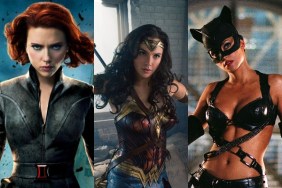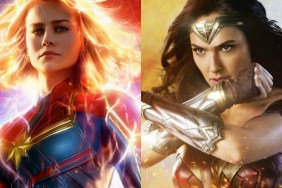Critics everywhere are currently in the midst of a frenzy of praise over Patty Jenkins’ Wonder Woman, the fourth film in the DC Extended Universe series, and the first feature film to headline a female superhero character since Elektra (a spin-off of the maligned Daredevil) in 2005. That Wonder Woman, a mightily popular comic book character created in 1941, is finally starring in a live-action film is, of course, a significant chapter in the history of the comic book film genre. It’s taken studios a long, long time to incorporate women into the predominantly male world of superheroes, and that we have such an iconic character starring in such a widely praised movie is – finally – completing the canon.
Pundits everywhere, upon this news, have hastened to look back over the history of female-led superhero movies, and have repeatedly uncovered the usual trio of cinematic heroine embarrassments: 1984’s Supergirl, 2004’s Catwoman, and the aforementioned Elektra. While each of these movies may have defensible details, none of them is considered remotely good overall, and none of them were large hits. These three films spell out a dark narrative that ostensibly kept studios from making films about other superheroines for many, many years.
But, for some reason, most pundits and studios have failed to mention the best superheroine film to come before Wonder Woman: Rachel Talalay’s 1995 post-apocalyptic punk flick Tank Girl, based on the comics by Jamie Hewlett and Alan Martin.

United Artists
Also: ‘Wonder Woman’ Review | You’re a Wonder, Wonder Woman
Tank Girl, a cult hit, takes place in a distant future when water is scarce, and hoarded by evil rich men in an ivory tower. The populace lives in the desert, facing thirst, a lack of resources, and the occasional mutant (half-kangaroo men live out in the wasteland). The title character, played by the awesome Lori Petty, is a rambunctious, half-crazed punker who commandeers a tank and fights the powers that be. The film features a weird story, animated sequences, and one of the best soundtrack records of the 1990s (which is saying something).
Of all the major studio superheroine films – perhaps even Wonder Woman included – Tank Girl features perhaps the most rebellious, most interesting, and most entertaining protagonist. Tank Girl is anti-establishment, energetic, driven, and funny. She has a weird sense of humor, an open mind (she smooches one of the kangaroo men), and an assertive libido. Director Talalay had previously directed a few crazy horror films – including the off-the-wall Freddy’s Dead: The Final Nightmare – and seemingly wanted to create an on-screen female character that would inspire audiences through attitude and a middle finger rather than familiar, inspiring slogans.

United Artists
Also: Why Did It Take 75 Years to Make a Wonder Woman Movie?
Tank Girl came out at a time when post-feminist sexuality was bubbling into mainstream consciousness, when a lot of previous modes of conventional entertainment were being deconstructed from within, and when semi-satirical characters like Tank Girl could actually make their way to the big screen. As such, we have a movie where the main character masturbates, flirts with other women, and even toys around with S&M. In 1995, these things were considered daring. These days, it might even be downright taboo; can you imagine Wonder Woman or Captain America masturbating in a big studio feature film? Oh wait, we did get that kind of recently. Thank you, Deadpool.
Tank Girl‘s punk rock daring and open, non-objectified sexuality has left a greater impact on culture than the film’s meager financial success may belie. Feminist essays, punk bands, and Gwen Stefani can all be connected to philosophies of Tank Girl. It is perhaps the cinematic exemplar of the riot grrrl movement, and carries with it – lightly – a wonderful take-charge, damn-the-man attitude that modern films wouldn’t dare handling. Modern blockbusters are yoked with the burden of having to appeal to the widest possible audience. Tank Girl was free from such fetters.

United Artists
The film’s authors seem to feel that Tank Girl‘s riotous feminism is more natural and healthier even than the comparable, contemporary movie heroines. Rachel Talalay didn’t turn her protagonist into a masculine heroine who simply does what men do. She created action heroine who was actually feminine. No small feat in the filmmaking culture of the 1990s.
What’s more, Tank Girl is just weird. Tank Girl‘s aggressive oddness is immensely appealing. It doesn’t play with a net, granting audiences a gaudy, subversive, unique, deliberately off-putting thrill. It’s wonderfully dizzying, even if the plot is simple, and the scene-by-scene story construction doesn’t make a great deal of sense. Tank Girl is a cartoon character, a spiritual relative of Harley Quinn and Babs Bunny.
So the next time you have a conversation about Wonder Woman – and there will be many over this weekend and beyond – remember that there was at least one other quality female superhero movie to come from a major studio. Tank Girl should be recognized as part of the canon.
Ten Wonder Woman Comic Book Stories You Have to Read:
Top Image: United Artists
Witney Seibold is a longtime contributor to the CraveOnline Film Channel, and the co-host of The B-Movies Podcast and the TV podcast Canceled Too Soon. He also contributes to Legion of Leia, Nerdist, and Blumhouse. You can follow him on “The Twitter” at @WitneySeibold, where he is slowly losing his mind.
10 Wonder Woman Stories to Read Before (and After) the Movie
-
10. The Legend of Wonder Woman

DC Comics’ digital-first Wonder Woman series ran almost concurrently with the DC Rebirth launch. This is stripped down storytelling at its finest. Wonder Woman’s classic origin is securely in place in this continuity, even in the wake of the update it received in the New 52. The Legend of Wonder Woman highlights Diana’s World War II origin with Steve Trevor responsible for her leaving Themyscira and Etta Candy acting as a mentor for Diana Prince as she transitions into “Man’s World”.
Writer/artist Raene De Liz injects a lot of feminism and body positivity in her Wonder Woman tale, and not just to the title character. The most wonderful thing she achieves with this run is a Wonder Woman story that is all-ages friendly. It can - and should - be given to readers of all ages and all genders. In a post-Watchmen world these types of stories are increasingly difficult to come by and when such superhero runs are well-executed they deserve to be celebrated.
Photo: DC Comics
-
9. Wonder Woman: Year One

DC Rebirth was a company-wide rebranding that DC undertook in 2016, which focused on returning to the roots of the characters. Wonder Woman: Year One is one of the best examples of the mandate. It marks writer Greg Rucka’s triumphant return to the character in the wake of his wildly successful original run (which will be featured later on this list). Artist Nicola Scott not only breathes stunning visual life into this story, but cements herself as one of the leading artists of the contemporary era.
Year One revisits Diana’s origin for the new timeline, while helping to establish her standing conflict with Ares. In the wake of the announcement that Wonder Woman is bisexual it also begins touching on this element of her life, which hasn’t been explored as much as it probably ought to have been. Readers will see a softer side of Diana in this story and happily note that her softness and intelligence does not diminish her fierceness. Rather, it makes her stronger, and a better hero.
Photo: DC Comics
-
8. Spirit of Truth

Writer Paul Dini and artist Alex Ross use Wonder Woman to address issues unique to our modern world. Spirit of Truth touches only briefly on Diana’s Themysciran origin, rather choosing to focus on her as a feminist figure for women the world over. That’s not even a strictly meta-textual theme. Throughout Spirit of Truth Diana is forced to examine who exactly it is that she stands for in “Man’s World” and how she wants to comport herself accordingly.
In bringing Diana to modern day she ends up facing off against terrorists and going to places in the world that many of the readers have never been. The story does a good job at showing and telling the reader to think critically - and openly - about some very current world events through the lens of Wonder Woman’s naïveté about our contemporary history. Dini and Ross continue their streak of leaving indelible marks on modern superheroes with Spirit of Truth. Wonder Woman is proven worthy of her continued status in the zeitgeist - and the visuals are painterly in a manner that recalls the ancient inspiration in the character.
Photo: DC Comics
-
7. Paradise Lost

Phil Jimenez brings a collection of different Wonder Woman adventures to life in the pages of Paradise Lost. If you’re a Wonder Woman/Batman shipper, or just a fan of the characters interacting, the opening story takes place in Gotham City. Ares has drawn Diana to the Dark Knight’s City by imbuing some of his Rogue’s Gallery with heightened abilities and making them even more dangerous than they have ever been in the past. Whether or not you decide to read any more of Paradise Lost - and you really, really should - this first story is so epic that you are going to want to check it out.
Diana also gets the chance to team up with another Wonder Woman of the DC Comics Universe when Lois Lane learns what a day-in-the-life is like. Jimenez juxtaposes these two characters exceptionally, and doesn’t pit them against each others as rivals simply because they’re powerful females existing in the same space. Paradise Lost is an awesome collection of stories that a reader doesn’t need to know anything about the time period continuity in order to enjoy. It will get you hyped up to go and see the Wonder Woman movie once you’ve put the stories down.
Photo: DC Comics
-
6. The Circle

The Circle was writer Gail Simone’s debut on Wonder Woman. Following this she would go on to more stories and she currently holds the record as the longest-running female writer on the character, which is really, really cool! On the production history side of The Circle it is an important issue that DC Comics should look back at the importance of as they transition into a new female writer for the main Wonder Woman book. Diana has been woefully under-penned by talented ladies.
The story addresses the mixed feelings of certain Amazonians following the birth of the first baby on Paradise Island. It explores how difficult an event this must have been in Themysciran society. Fans of The Flash will enjoy it when Diana teams up with genius gorillas in order to take down Neo-Nazis. I know that probably reads as super, super crazy, but the action is on point and a wonderful counterpart to the more poignant aspects of the issue’s narrative.
Photo: DC Comics
-
5. Wonder Woman Earth One

Grant Morrison is joined by the art team of Yanick Paquette and Nathan Fairbairn in an Elseworlds retelling of the Wonder Woman origin. Earth One does not shy away from the sexual overtones that so clearly inspired the creation of Princes Diana of Themyscira, even while it attempts to reconcile this with her brute strength and feminist iconography. It embraces her bisexuality openly by giving Diana romantic interests of both genders at different times throughout the narrative. Along with Diana, classic characters like Steve Trevor and Etta Candy are reimagined in this story and distilled down to illustrate the core values that have made their characters timeless in the same way that the star of the story has.
Earth One succeeds in adapting what could have been difficult subject matter from Wonder Woman’s Golden Age origin and empowering a contemporary adaptation by modern sensibilities. Paquette draws a stunning Wonder Woman who appears physically proportional to her legendary strength, rather than something closer to a Hollywood starlet standard of beauty - and it’s hard to contend that she ever looked better than she does in Earth One.
Photo: DC Comics
-
4. Wonder Woman: The Golden Age

The real world circumstances that surrounded William Moulton Marston’s creation of Wonder Woman are almost as well-known a piece of her mythology as Paradise Island itself. In order to completely understand something, it is pertinent to start at the beginning, which is why you should read some of her Golden Age Adventures. Plus, DC Comics has two gigantic, stunning omnibuses that you can pick up right now, so you can read your way forward from 1941.
Superman and Batman have Golden Age collections as well, but Wonder Woman’s are better. There are more overarching themes and narrative in Sensation Comics than Action or Detective, with characters that readers meet in the first issue popping up time and time again in the first ten stories and the mythology of the Amazons firmly established by issue seven. All of this is wrapped up in overtones of bondage, burgeoning feminism and Anti-Nazi propaganda. If you ever want to see Wonder Woman punch Nazis before throwing them over her shoulder and jumping out of skyscraper windows you’ll be able to find it all conveniently in one place. You will also be pleasantly surprised at how much our current version of Wonder Woman resembles her founding counterpart.
Photo: DC Comics
-
3. Greg Rucka’s (first) Wonder Woman

For many modern readers the original Greg Rucka run on Wonder Woman is the definitive one. They have recently been reprinted in beautiful collected volumes and the first storyline is called The Hiketeia. Wonder Woman is living and working in Washington, DC as the ambassador from Themyscira. (You may remember when Wonder Woman was briefly made an honorary UN ambassador - this is the place that idea likely generated from.)
In the first arc she faces down - and defeats - Batman in her quest to protect a young woman from prosecution. This run establishes Diana’s incredible physical prowess, transposed against her internal life and the philosophies that drive every decision she makes. It does an excellent job at examining Diana Prince’s status as an immigrant and what it must be like for her to adjust to life in a new country. For being one of the richest examinations of such an iconic character and having Wonder Woman step on Batman’s head, this storyline is worth picking up.
Photo: DC Comics
-
2. George Perez’s Wonder Woman

Post Crisis on Infinite Earths, almost every DC Comics character underwent massive changes and growth - Wonder Woman was no different. Not only does George Perez draw the best hair Wonder Woman has ever had, but this storyline really cemented Themyscira’s ties back to ancient Greece and the mythology of that period. Without Wonder Woman Vol. 2 we wouldn’t have Diana as a DemiGod - the current status quo - which has become one of the defining characteristics of her existence.
This run first established Ares as the biggest baddest Wonder Woman villain (the Joker to her Batman, if you will), and sought to establish a rogues gallery for Diana that could stand up alongside her male counterparts. The Dr. Barbara Ann Minerva’s version of Cheetah also came out of this run; she’s currently showing up in Wonder Woman: Rebirth. Much of what informed the Justice League Wonder Woman and the contemporary Wonder Woman comics was born from this 1980s series. Also, for the first time Diana gets meaningful romantic interactions with someone besides Steve Trevor.
Photo: DC Comics
-
1. Wonder Woman New 52

The creative team that took over Wonder Woman when DC’s New 52 initiative was launched was writer Brian Azzarello and artist Cliff Chiang. Together they managed to give Diana Prince one of the most meaningful reinventions to date. They are responsible for retconning Diana’s origin so that she is no longer a soulless golem sculpted from clay, but rather the daughter born from the union of Zeus and Hippolyta - therefore, a Demigod. Since her inception Diana’s story has been inextricably intertwined with the Greek pantheon and elevating her to the status of godhood cements just how important this modern addition to the mythos is.
The first volume of this storyline is called Blood and has very obviously effected the Wonder Woman movie, so if you want a good sense of where that has drawn inspiration from you are going to want to at least pick up the first installation. Its importance to Wonder Woman’s history aside, Cliff Chiang draws one of the fiercest Dianas around and manages to instill a visual sense of grace and beauty to even her most violent actions. Unfortunately, there are only 40 issues of goodness here because the creative team that picked up in the wake of Azzarello and Chiang ignored many of the excellent changes that were established during this run.
Photo: DC Comics








